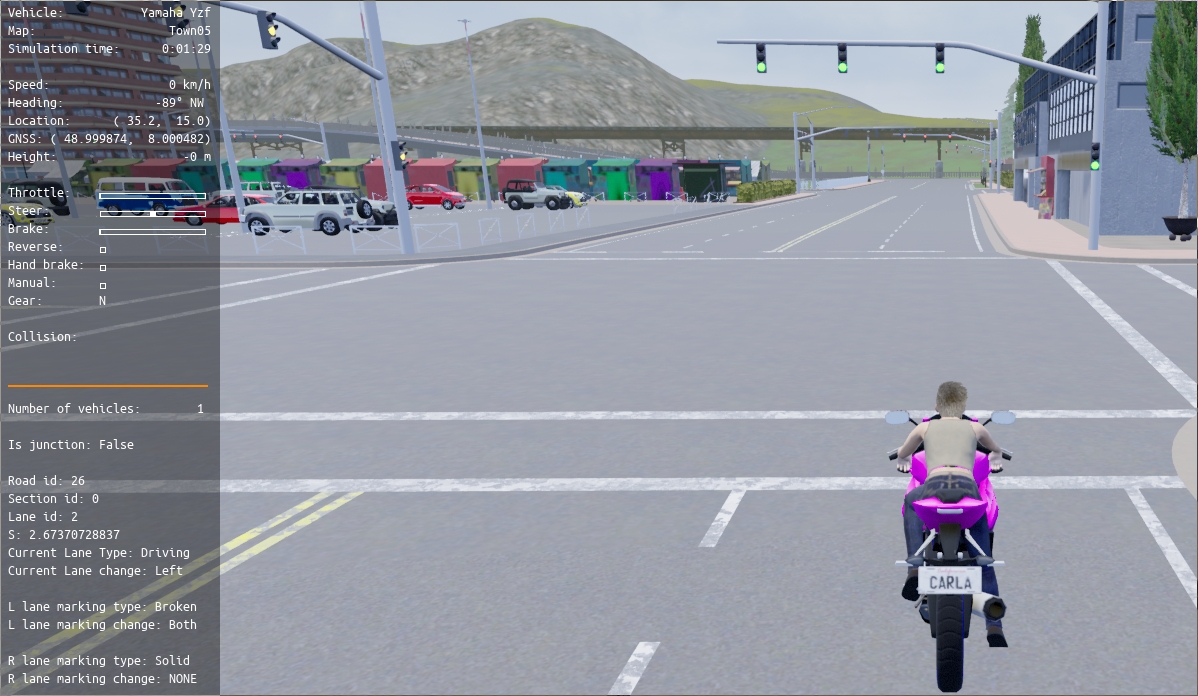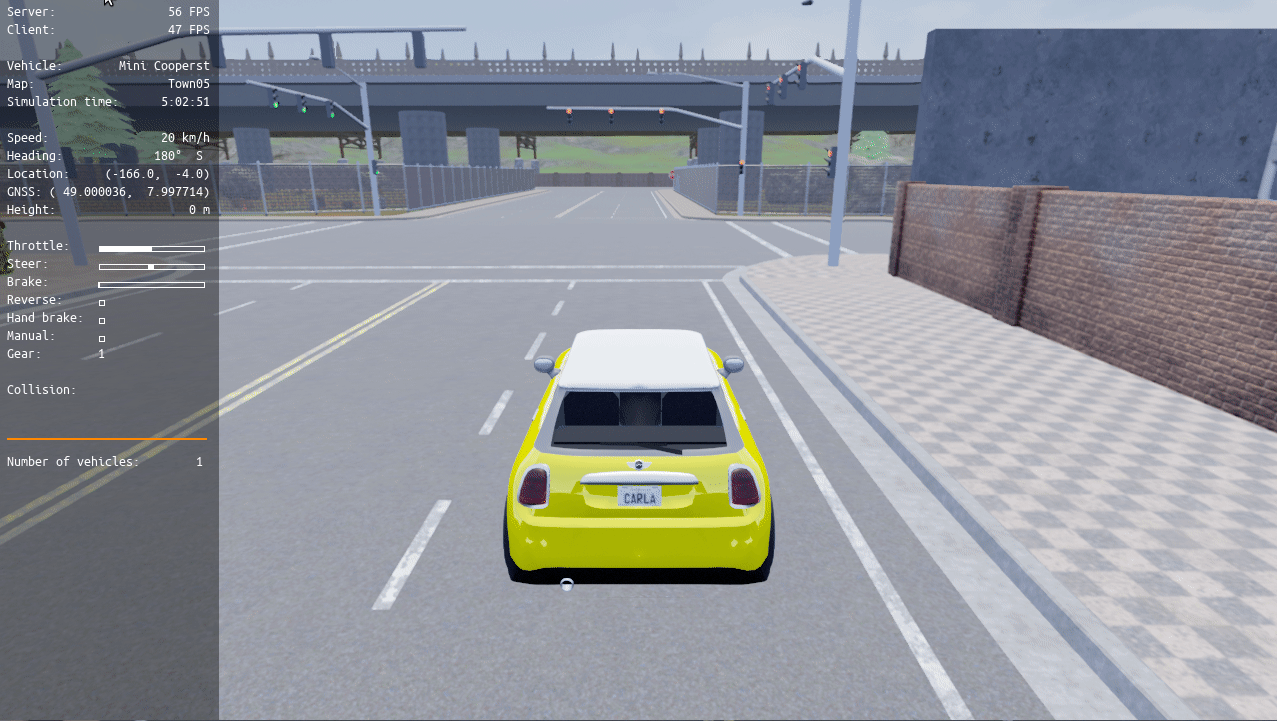12 KiB
Code recipes
This section contains a list of recipes that complement the first steps section and are used to illustrate the use of Python API methods.
Each recipe has a list of python API classes, which is divided into those in which the recipe is centered, and those that need to be used.
There are more recipes to come!
- Actor Spectator Recipe
- Attach Sensors Recipe
- Actor Attribute Recipe
- Converted Image Recipe
- Lanes Recipe
- Debug Bounding Box Recipe
- Debug Vehicle Trail Recipe
- Parsing Client Arguments Recipe
- Traffic Light Recipe
- Walker Batch Recipe
Actor Spectator Recipe
This recipe spawns an actor and the spectator camera at the actor's location.
Focused on:
carla.World
carla.Actor
Used:
carla.WorldSnapshot
carla.ActorSnapshot
# ...
world = client.get_world()
spectator = world.get_spectator()
vehicle_bp = random.choice(world.get_blueprint_library().filter('vehicle.bmw.*'))
transform = random.choice(world.get_map().get_spawn_points())
vehicle = world.try_spawn_actor(vehicle_bp, transform)
# Wait for world to get the vehicle actor
world.tick()
world_snapshot = world.wait_for_tick()
actor_snapshot = world_snapshot.find(vehicle.id)
# Set spectator at given transform (vehicle transform)
spectator.set_transform(actor_snapshot.get_transform())
# ...
Attach Sensors Recipe
This recipe attaches different camera / sensors to a vehicle with different attachments.
Focused on:
carla.Sensor
carla.AttachmentType
Used:
carla.World
# ...
camera = world.spawn_actor(rgb_camera_bp, transform, attach_to=vehicle, attachment_type=Attachment.Rigid)
# Default attachment: Attachment.Rigid
gnss_sensor = world.spawn_actor(sensor_gnss_bp, transform, attach_to=vehicle)
collision_sensor = world.spawn_actor(sensor_collision_bp, transform, attach_to=vehicle)
lane_invasion_sensor = world.spawn_actor(sensor_lane_invasion_bp, transform, attach_to=vehicle)
# ...
Actor Attribute Recipe
This recipe changes attributes of different type of blueprint actors.
Focused on:
carla.ActorAttribute
carla.ActorBlueprint
Used:
carla.World
carla.BlueprintLibrary
# ...
walker_bp = world.get_blueprint_library().filter('walker.pedestrian.0002')
walker_bp.set_attribute('is_invincible', True)
# ...
# Changes attribute randomly by the recommended value
vehicle_bp = wolrd.get_blueprint_library().filter('vehicle.bmw.*')
color = random.choice(vehicle_bp.get_attribute('color').recommended_values)
vehicle_bp.set_attribute('color', color)
# ...
camera_bp = world.get_blueprint_library().filter('sensor.camera.rgb')
camera_bp.set_attribute('image_size_x', 600)
camera_bp.set_attribute('image_size_y', 600)
# ...
Converted Image Recipe
This recipe applies a color conversion to the image taken by a camera sensor, so it is converted to a semantic segmentation image.
Focused on:
carla.ColorConverter
carla.Sensor
# ...
camera_bp = world.get_blueprint_library().filter('sensor.camera.semantic_segmentation')
# ...
cc = carla.ColorConverter.CityScapesPalette
camera.listen(lambda image: image.save_to_disk('output/%06d.png' % image.frame, cc))
# ...
Lanes Recipe
This recipe shows the current traffic rules affecting the vehicle. Shows the current lane type and if a lane change can be done in the actual lane or the surrounding ones.
Focused on:
carla.LaneMarking
carla.LaneMarkingType
carla.LaneChange
carla.LaneType
Used:
carla.Waypoint
carla.World
# ...
waypoint = world.get_map().get_waypoint(vehicle.get_location(),project_to_road=True, lane_type=(carla.LaneType.Driving | carla.LaneType.Shoulder | carla.LaneType.Sidewalk))
print("Current lane type: " + str(waypoint.lane_type))
# Check current lane change allowed
print("Current Lane change: " + str(waypoint.lane_change))
# Left and Right lane markings
print("L lane marking type: " + str(waypoint.left_lane_marking.type))
print("L lane marking change: " + str(waypoint.left_lane_marking.lane_change))
print("R lane marking type: " + str(waypoint.right_lane_marking.type))
print("R lane marking change: " + str(waypoint.right_lane_marking.lane_change))
# ...
Debug Bounding Box Recipe
This recipe shows how to draw traffic light actor bounding boxes from a world snapshot.
Focused on:
carla.DebugHelper
carla.BoundingBox
Used:
carla.ActorSnapshot
carla.Actor
carla.Vector3D
carla.Color
# ....
debug = world.debug
world_snapshot = world.get_snapshot()
for actor_snapshot in world_snapshot:
actual_actor = world.get_actor(actor_snapshot.id)
if actual_actor.type_id == 'traffic.traffic_light':
debug.draw_box(carla.BoundingBox(actor_snapshot.get_transform().location,carla.Vector3D(0.5,0.5,2)),actor_snapshot.get_transform().rotation, 0.05, carla.Color(255,0,0,0),0)
# ...
Debug Vehicle Trail Recipe
This recipe is a modification of
lane_explorer.py example.
It draws the path of an actor through the world, printing information at each waypoint.
Focused on:
carla.DebugHelper
carla.Waypoint
carla.Actor
Used:
carla.ActorSnapshot
carla.Vector3D
carla.LaneType
carla.Color
carla.Map
# ...
current_w = map.get_waypoint(vehicle.get_location())
while True:
next_w = map.get_waypoint(vehicle.get_location(), lane_type=carla.LaneType.Driving | carla.LaneType.Shoulder | carla.LaneType.Sidewalk )
# Check if the vehicle is moving
if next_w.id != current_w.id:
vector = vehicle.get_velocity()
# Check if the vehicle is on a sidewalk
if current_w.lane_type == carla.LaneType.Sidewalk:
draw_waypoint_union(debug, current_w, next_w, cyan if current_w.is_junction else red, 60)
else:
draw_waypoint_union(debug, current_w, next_w, cyan if current_w.is_junction else green, 60)
debug.draw_string(current_w.transform.location, str('%15.0f km/h' % (3.6 * math.sqrt(vector.x**2 + vector.y**2 + vector.z**2))), False, orange, 60)
draw_transform(debug, current_w.transform, white, 60)
# Update the current waypoint and sleep for some time
current_w = next_w
time.sleep(args.tick_time)
# ...
The image below shows how a vehicle loses control and drives on a sidewalk. The trail shows the path it was following and the speed at each waypoint.
Parsing Client Arguments Recipe
This recipe shows in every script provided in PythonAPI/Examples and it is used to parse the client creation arguments when running the script.
Focused on:
carla.Client
Used:
carla.Client
argparser = argparse.ArgumentParser(
description=__doc__)
argparser.add_argument(
'--host',
metavar='H',
default='127.0.0.1',
help='IP of the host server (default: 127.0.0.1)')
argparser.add_argument(
'-p', '--port',
metavar='P',
default=2000,
type=int,
help='TCP port to listen to (default: 2000)')
argparser.add_argument(
'-s', '--speed',
metavar='FACTOR',
default=1.0,
type=float,
help='rate at which the weather changes (default: 1.0)')
args = argparser.parse_args()
speed_factor = args.speed
update_freq = 0.1 / speed_factor
client = carla.Client(args.host, args.port)
Traffic Light Recipe
This recipe changes from red to green the traffic light that affects the vehicle. This is done by detecting if the vehicle actor is at a traffic light.
Focused on:
carla.TrafficLight
carla.TrafficLightState
Used:
carla.Vehicle
# ...
if vehicle_actor.is_at_traffic_light():
traffic_light = vehicle_actor.get_traffic_light()
if traffic_light.get_state() == carla.TrafficLightState.Red:
# world.hud.notification("Traffic light changed! Good to go!")
traffic_light.set_state(carla.TrafficLightState.Green)
# ...
Walker Batch Recipe
# 0. Choose a blueprint fo the walkers
world = client.get_world()
blueprintsWalkers = world.get_blueprint_library().filter("walker.pedestrian.*")
walker_bp = random.choice(blueprintsWalkers)
# 1. Take all the random locations to spawn
spawn_points = []
for i in range(50):
spawn_point = carla.Transform()
spawn_point.location = world.get_random_location_from_navigation()
if (spawn_point.location != None):
spawn_points.append(spawn_point)
# 2. Build the batch of commands to spawn the pedestrians
batch = []
for spawn_point in spawn_points:
walker_bp = random.choice(blueprintsWalkers)
batch.append(carla.command.SpawnActor(walker_bp, spawn_point))
# 2.1 apply the batch
results = client.apply_batch_sync(batch, True)
for i in range(len(results)):
if results[i].error:
logging.error(results[i].error)
else:
walkers_list.append({"id": results[i].actor_id})
# 3. Spawn walker AI controllers for each walker
batch = []
walker_controller_bp = world.get_blueprint_library().find('controller.ai.walker')
for i in range(len(walkers_list)):
batch.append(carla.command.SpawnActor(walker_controller_bp, carla.Transform(), walkers_list[i]["id"]))
# 3.1 apply the batch
results = client.apply_batch_sync(batch, True)
for i in range(len(results)):
if results[i].error:
logging.error(results[i].error)
else:
walkers_list[i]["con"] = results[i].actor_id
# 4. Put altogether the walker and controller ids
for i in range(len(walkers_list)):
all_id.append(walkers_list[i]["con"])
all_id.append(walkers_list[i]["id"])
all_actors = world.get_actors(all_id)
# wait for a tick to ensure client receives the last transform of the walkers we have just created
world.wait_for_tick()
# 5. initialize each controller and set target to walk to (list is [controller, actor, controller, actor ...])
for i in range(0, len(all_actors), 2):
# start walker
all_actors[i].start()
# set walk to random point
all_actors[i].go_to_location(world.get_random_location_from_navigation())
# random max speed
all_actors[i].set_max_speed(1 + random.random()) # max speed between 1 and 2 (default is 1.4 m/s)
To destroy the pedestrians, stop them from the navigation, and then destroy the objects (actor and controller):
# stop pedestrians (list is [controller, actor, controller, actor ...])
for i in range(0, len(all_id), 2):
all_actors[i].stop()
# destroy pedestrian (actor and controller)
client.apply_batch([carla.command.DestroyActor(x) for x in all_id])



